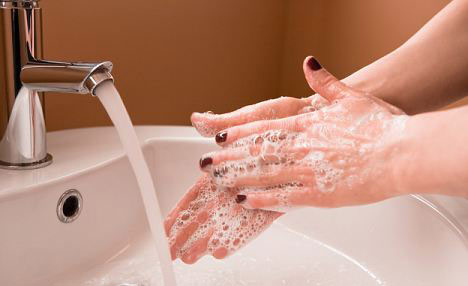|
 Only 39 percent of participants said they washed their hands before eating |
|
Next time you get your debit card out, you might want to use it to buy some hand wash. A study has found that nearly one in 10 bank cards contains faecal matter. Cash is little better with one in seven bank notes containing high levels of bacteria similar to that found in a dirty toilet bowl. The research, carried out at Queen Mary, University of London and the London School of Hygiene & Tropical Medicine, showed our hands are therefore dirtier than we might think. More than a quarter (26 percent) of hands sampled showed traces of faecal contamination including bacteria such as E.coli, the study found. And we may be making ourselves ill as a result. A further survey of the 272 participants revealed only 39 percent washed their hands before eating. The vast majority (91 percent) of respondents also stated that they washed their hands after using the toilet, although the levels of faecal organisms contaminating the cards and currency suggested otherwise, researchers said. Washing hands with soap can reduce diarrhoeal infections by up to 42 percent but only 69 percent of people reported doing this whenever possible. Dr Ron Cutler, who led the research at Queen Mary, said: 'Our analysis revealed that by handling cards and money each day we are coming into contact with some potential pathogens revealing faecal contamination including E. coli and Staphylococci. 'People may tell us they wash their hands but the research shows us different, and highlights just how easily transferable these pathogens are, surviving on our money and cards.' Dr Val Curtis, from London School of Hygiene & Tropical Medicine, said: 'Our research shows just how important handwashing is - the surprising levels of contamination that we found on everyday objects is a sign that people are forgetting to wash their hands after the toilet, one of the key moments for infection prevention.' Nick Wilcher, marketing manager of Radox, who funded the study to raise awareness of Global Handwashing Day, said: 'Our research highlights just how much bacteria we are exposed to in our everyday lives, on objects such as money and cards. 'We hope this study makes people think twice and encourages people to wash their hands after going to the toilet and before eating.' (Read by CJ Henderson. CJ Henderson is a journalist at the China Daily Website.) (Agencies) |
下次你把自己的提款卡拿出來(lái)時(shí),也許你會(huì)想用它去買些洗手液。 一項(xiàng)研究發(fā)現(xiàn),近十分之一的銀行卡都攜帶糞便物質(zhì)。現(xiàn)金還稍微好點(diǎn),七分之一的鈔票上所含的大量細(xì)菌相當(dāng)于骯臟的抽水馬桶的細(xì)菌含量。 倫敦大學(xué)瑪麗皇后學(xué)院與倫敦衛(wèi)生學(xué)和熱帶醫(yī)學(xué)院開(kāi)展的這一研究顯示,我們的手比我們想的還要臟。 研究人員對(duì)人的手進(jìn)行取樣,在超過(guò)四分之一(26%)的小樣上發(fā)現(xiàn)了糞便污染物的痕跡,其中包括大腸桿菌這樣的細(xì)菌。 我們還可能因此而染上病。對(duì)272名參與者的進(jìn)一步調(diào)查揭示,只有39%的人在吃飯前洗手。 此外,絕大多數(shù)(91%)的被調(diào)查者稱自己在上完廁所后會(huì)洗手,然而研究人員稱,銀行卡和鈔票上攜帶的糞便污染物含量反映出的卻不是這么一回事。 用肥皂洗手可以將腹瀉感染幾率降低42%以上,但只有69%的人報(bào)告說(shuō)自己只要可能都會(huì)用肥皂洗手。 瑪麗皇后學(xué)院帶頭開(kāi)展這一研究的羅恩?卡特勒博士說(shuō):“我們的分析揭示,每天接觸銀行卡和鈔票之時(shí),我們都在和數(shù)種潛在病原體打交道,包括大腸桿菌和葡萄球菌這樣的糞便污染物。 “人們也許告訴我們他們洗了手,但是研究顯示出的結(jié)果卻不是這樣,這突出表明這些存活在我們的鈔票和銀行卡上的病原體是多么容易被傳播。 來(lái)自倫敦衛(wèi)生學(xué)和熱帶醫(yī)學(xué)院的瓦爾?柯第斯博士說(shuō):“我們的研究顯示出洗手有多么重要——我們?cè)谌粘N锲飞习l(fā)現(xiàn)的污染物含量高得驚人,這表示人們?cè)谌鐜笸浵词郑鐜笙词謱?duì)于預(yù)防傳染病十分重要。” 該研究由樂(lè)多適公司出資贊助,目的是為了提高公眾對(duì)世界洗手日的意識(shí)。樂(lè)多適公司的營(yíng)銷經(jīng)理尼克?威爾徹說(shuō):“我們的研究突出顯示了我們?cè)谌粘I钪薪佑|的細(xì)菌有多少,像鈔票和銀行卡這樣每日經(jīng)手的物品上就含有這么多細(xì)菌。 “我們希望這一研究能讓人們好好想一想,鼓勵(lì)人們?cè)谌鐜蠛统燥埱岸枷聪词帧!?/p> 相關(guān)閱讀 紐約被評(píng)為美國(guó)最臟城市 游客稱有尿騷味 新加坡發(fā)起全民洗手運(yùn)動(dòng) 防止疾病傳播 (中國(guó)日?qǐng)?bào)網(wǎng)英語(yǔ)點(diǎn)津 陳丹妮 編輯:Julie) |
|
Vocabulary: debit card: 提款卡 faecal: 糞便的,排泄物的 E.coli: 大腸桿菌 diarrhoeal: 腹瀉的 pathogen: 病原體;病菌 Staphylococci: 葡萄球菌 |
